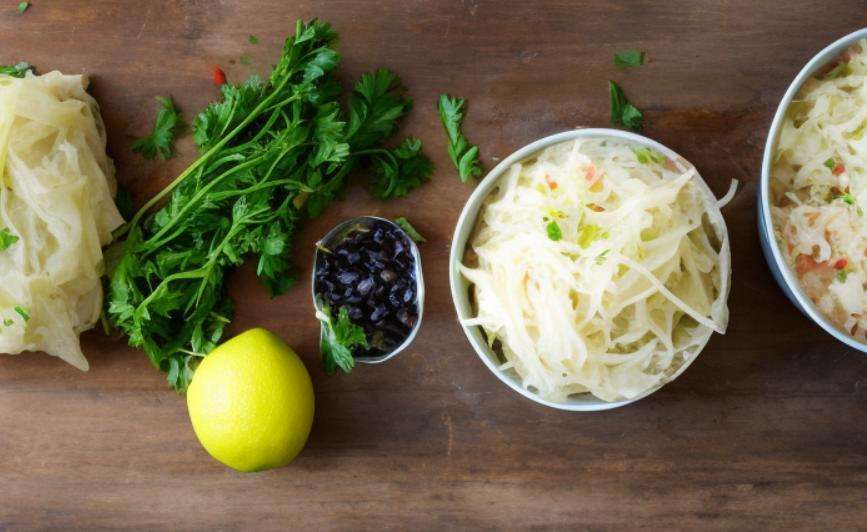The benefits of sauerkraut, the indispensable flavor of winter tables, are countless. Some studies have found that sauerkraut may contain more vitamin C than most fresh fruits and vegetables. Here are 6 reasons why you should love sauerkraut more…
Fermented foods are not just a burst of tangy, acidic flavor; they are widely known for their digestive and immune benefits. If you’re stepping into the world of probiotic-rich fermented foods that support a healthy balance of good gut bacteria, it’s time to add sauerkraut to your rotation.
Sauerkraut has been around for thousands of years. Although it is often associated with German cuisine, it has its origins in ancient China. It is still used and loved today for its flavor, nutritional profile and health benefits. It is primarily consumed as a condiment or sauce on other foods or dishes.
If you need some ideas on how to add sauerkraut to your diet, dietitians have some suggestions. “I love adding sauerkraut to salads, sandwiches, burgers, tacos and scrambled eggs,” says dietitian nutritionist Jenna Volpe.
“Sauerkraut is often added to soups, braised meats and stir-fried dishes,” says chef and dietitian Cindy Chou, adding that sauerkraut pairs well with grilled cheese sandwiches and sautéed sausages.
Here are more reasons to add this fermented vegetable dish to your next shopping list…
Health Benefits of Sauerkraut
Sauerkraut is rich in gut-friendly probiotics.
You can’t discuss probiotic-rich foods without mentioning sauerkraut. It’s true that fermenting cabbage to make sauerkraut creates probiotics that produce lactic acid, which is beneficial for gut and immune health. In fact, researchers found more than 200 strains of gut-friendly bacteria in one batch of sauerkraut.
Volpe says research on probiotic foods like sauerkraut is still just the tip of the iceberg, but the current research is promising for those looking for a tasty way to improve their digestion. She points to a 2021 review in which researchers found that sauerkraut can improve symptoms of Irritable Bowel Syndrome (IBS).
Speaking of gut health, sauerkraut can also be a good source of fiber. According to the USDA, a 100-gram serving of sauerkraut contains about 3 grams of fiber, which supports healthy digestion, regularity and the microbiome.
It is a rich source of vitamin C.
Vitamin C is known for its immune-boosting properties, and sauerkraut can be a good way to get even more of it. In fact, according to a 2021 study evaluating the nutrients in fermented cabbage products, the vitamin C content in sauerkraut may be higher than most fresh vegetables. The amount of vitamin C in sauerkraut can vary, but the researchers noted that it can range from 20.1 to 256.31 milligrams per 100 grams. Most adults need 70 to 90 milligrams of vitamin C per day, and enjoying sauerkraut can certainly help you reach that point.
Supports a healthy immune system.
Thanks to the powerful vitamin C and probiotics, sauerkraut is part of a healthy, balanced diet for optimal immune function. “The brine in sauerkraut has a protective, immune-balancing effect on the gut by helping the immune system fight pathogenic microbes,” explains Volpe. “While we don’t know the exact mechanism, it’s safe to assume that the immune-boosting benefits of sauerkraut are likely attributed to the combination of healthy probiotics and vitamin C in sauerkraut.”
Vitamin C acts as an antioxidant and plays an important role in immunity. According to a 2017 review, foods rich in vitamin C, such as sauerkraut, support immunity by scavenging free radicals and preventing infections. Similarly, probiotics have been shown to have important effects on the immune system. Fortunately, sauerkraut is rich in this immune-supporting duo.
There is also a documented link between gut and immune health, and probiotics can help boost this. So by consuming more probiotic-rich foods to support your gut, this could also mean an increase in immune function.
It is high in antioxidants.
Vitamin C is not the only antioxidant you can expect to get from eating sauerkraut. The fermented food has a high total antioxidant capacity, as shown in a 2022 study. “Sauerkraut is a great food source of antioxidant compounds, including indole-3-carbinol, ascorbigen, sulforaphane and allyl isothiocyanate,” says Volpe. Antioxidants help fend off free radicals that can damage DNA and lead to signs of aging and diseases such as cancer, heart disease and Alzheimer’s.
Chinese sauerkraut has been shown to have free radical-scavenging antioxidants that may also have anti-inflammatory benefits. However, heating sauerkraut may slightly alter its antioxidant profile, according to the study, which is another reason to opt for raw varieties that are higher in probiotics.
It can help reduce inflammation.
Sauerkraut may have anti-inflammatory properties due to its antioxidant profile. According to a May 2021 review, there is strong scientific evidence that fermented foods such as sauerkraut have anti-inflammatory, antioxidant and anticarcinogenic activities, specifically protecting against DNA damage caused by oxidative stress (aka free radical damage).
Part of its ability to reduce inflammation can be explained by the presence of indole-3-carbinol, a substance derived from consuming cruciferous vegetables such as cabbage. “This antioxidant compound has been proven to help reduce inflammation, promote healthier hormone balance and even help prevent and fight the growth of cancer cells in the body,” says Volpe.
It is nutrient dense.
When you flavor your food with condiments like barbecue sauce, mayonnaise and tartar sauce, added sugars and nutrient-free calories can quickly add up. Sauerkraut is low in calories but packed with nutritional benefits (a small serving of sauerkraut – about 2 tablespoons – contains 12 calories).

